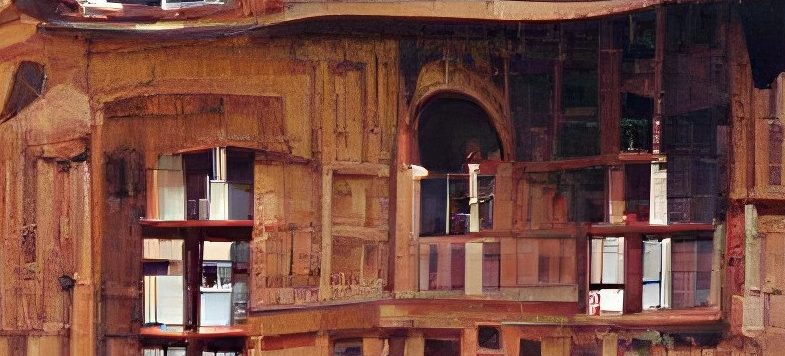Sticky eyes blinking open, Marta felt the uncanny familiarity of waking in a strange place settle on her. Normally, she would have scrambled to find her phone, her purse, her keys. If she hadn’t passed out in her clothes, she’d search for those as well, usually while trying to be stealthy enough not to wake the person she had found herself next to in whatever had passed for a bed.
Marta did not have that problem now. She had been to enough rehab centers that the manicured lawn, pristine white buildings, and preternaturally calm staff told her she was in a particularly rich cousin to that kind of healthcare facility. The shaking in her hands and her sensitivity to light told her she was suffering the after-effects of what had probably been a wonderfully fun combination of alcohol and god knows what else.
Whatever it had been, though, was long past and overshadowed by the dim recollection of emergency services arriving. There were some dim memory of a pitstop at a standard hospital, shadows of loved ones, mumbles about legal consent, and now she was here, a place she didn’t know but was, at the same time, known territory. Sitting in the sun, she pulled the terrycloth robe tighter over her patient’s gown and adjusted the dark glasses she was wearing, grateful to whatever kind soul had left her with them.
“Hello!” The cry came from across the yard, both friendly and authoritative. Among the white-clad nurses crossing the lawn to their scheduled responsibilities stood a sharp-dressed middle-aged man walking straight to Marta. He had the look of an academic, complete with elbow-patched tweed blazer and beard, but he moved up the grassy hill with a hustle one might expect from a courier with an important message.
Marta waved to him, finding the strength to produce a crinkled smile. Not long ago she might have hated the man on sight, as as anyone might a captor, but she had come to recognize that these people, even the ones in charge, were only executing the will of others, earnest helpers at best, incompetents at worst. Abusing them didn’t serve any purpose. Marta moved to rise from the lawn chair she had awakened on and found that she couldn’t, her legs too weak.
If the man noticed, he didn’t say anything, instead pulling up a lawn chair to sit next to Marta. He smiled warmly and didn’t offer any of the usual bromides she was accustom to, no “I hope you’re doing well,” or “I trust you’re comfortable.” Instead he looked directly at her with wide-set brown eyes and said, “Welcome to Difficult House.”
Marta cocked her head, certain she had misheard him. “Excuse me?”
“It’s what we call our facility – the Difficult House.” He looked around the grounds as he continued, “It’s been a long time since the campus was truly only one house, but we kept the name.”
Marta scanned the open yard again, suddenly finding the manicured lawn and white of the buildings imbued with foreboding, as if the name spoke of some hidden, gothic nature. Never one for impulse control, Marta translated this into, “Why? Is your team big fans of electro-shock therapy?”
“No, no! Of course not.” He laughed, ending it abruptly with, “Unless that’s something you you want to try.”
“Why would I want to try being electrocuted?”
“Under controlled circumstances it’s been shown to have positive effects on individuals with long-term and unshakeable depression.” He brought his eyes into a sharp focus onto Marta. “But that’s not your problem, is it?”
The presumption in the question, that this stranger somehow knew her, irked Marta. “And who are you?”
“Dr. Monroe. But that’s not important right now. What is important, is that you understand why you’re here.”
Marta felt an old, familiar bitterness well up, a feeling she had known since she was 14 and the maid had caught her with a bottle of schnapps and everything had spun out of control. “Oh, I understand why I’m here. You’ll keep me under wraps for a few weeks until I get clean, then we all pretend everything’s OK, you charge my grandmother a small fortune, and then let me go.”
Monroe nodded his head, lips pursed and eyes closed for a moment to communicate patient understanding. “I know that you’ve been through rehabilitation before. That must make it hard to trust.”
Marta laughed out loud at this, surprising even herself with its volume. “Then let me out of here and give me a ride downtown.”
“Well, no. You will be constantly observed here.”
“Then I’m a prisoner.”
“Only in the fact that you are the only person who will be able to secure your release.”
“Then I’m telling you to let me go.”
“Not right now.”
“Why not?”
“Because you are a difficult person.” The man paused as if he might put a comforting hand on Marta, but he had the good sense not to do that. “Marta, you’ve been been given everything one can be given to be happy. You have two loving parents, you were raised in comfort, had every opportunity for education or athleticism. Besides the damage you’ve done to yourself, you’re perfectly healthy. You have everything that a person could reasonably hope for.” He paused to let that sink in. “But here you are, in a facility that you never would have made it to if someone hadn’t dropped you off in an emergency room.”
“Then why didn’t they just let me die?” Marta found the edge she wanted to put into sentence wasn’t there, just a deep exhaustion.
“Your death would have caused any number of people a tremendous amount of pain.”
Marta tried to bury herself in the warm white robe. “They’d get over it. Everybody does.” The same tears she always cursed came at the thought of her grandfather, Desiree, the others, so many, close to her and gone now, and everyone else moving about their lives as if they had never existed.
She found the strength to look at the doctor. “You know this is as pointless as I do. Why bother?”
“Happiness is a thing that can exist, Marta. Even for you.”
Marta’s skepticism radiated out, even through the sunglasses. “Do you know how many rehab facilities I’ve been in?”
“Seven.”
“And what makes you think this will be different?”
“Because this one you won’t leave until you decide that you are happy.”
Marta tittered nervously, a habit she hated, but found herself frightened by the enormous implications of the statement. “And how are you going to make me happy?”
The doctor pulled back as if she had spoken in a foreign language. “No one here is going to make you happy. There’s certainly therapy, which I recommend daily, a neuro-pharmacist on staff to help with any imbalances, daily exercise classes of varying types, plus any type of academic class or skill acquisition you could hope for. Looking over your file, I suspect that might be the best place for you to start. See if there’s anything that grabs your interest.”
Marta smirked, “What if I want to learn how to be an escape artist?”
“I’m told that the library has a rather extensive collection of Houdini’s works. Or works about him. I’m not sure which.” He blinked again, concluding, “But that won’t help you.”
“I don’t see how staying here will.”
“That’s understandable. You’re fragile and in poor health. A few weeks of recovery and proper diet will go a long way. Beyond that, though, you’ll find the Difficult House isn’t just impossible to escape, it’s hard to leave.
“You can explore anything you want here, try new skills, meet new people, learn about ancient cultures, experiment with the latest technologies. You can put on plays or create podcasts, work in teams or spend your days in quiet, solitary contemplation. Other than the self-destructive behavior your historically inflicted on yourself, you can do whatever you’d like to try to discover what might make you happy.”
At those words, Marta felt an old hardness return to her chest, a stone that formed there whose weight was only matched by its coldness, a crushing iciness that wouldn’t allow her up from the chair even if her legs worked.
As this familiar feeling settled on her, Marta could feel the steady gaze of the doctor, but unlike some many loved ones, strangers, and professional observers before him, the accompanying sting of judgment wasn’t there.
It was this that let Marta wipe a tear from her cheek and ask, “What if I can’t? What if I’m just not capable of it? Some people can’t walk. Maybe I can’t be happy.”
The doctor smiled again, but it wasn’t dismissive or filled with a pep-talk glee, but a calm that Marta envied. So she listened to him when he said, “Marta, part of the problem is how our society defines happiness. It tends to get packaged as some kind of deep, intense bliss that’s somehow permanent. A joy that isn’t real unless it’s always with you. But happiness is different for everyone. What’s happiness for you might be entirely unrecognizable for someone else.”
A shadow, as if from a great bird, passed over them. When the flicker of that was gone, Marta asked, “How will I know what happiness is?”
“I don’t know,” Monroe responded. “It is our hope that being here will help you figure that out for yourself.
“Welcome to the Difficult House.”
See author’s published work here.
Related Posts
The American: Chapter 79 Next Post:
The American: Trouble on All Sides (pt. 1)


























